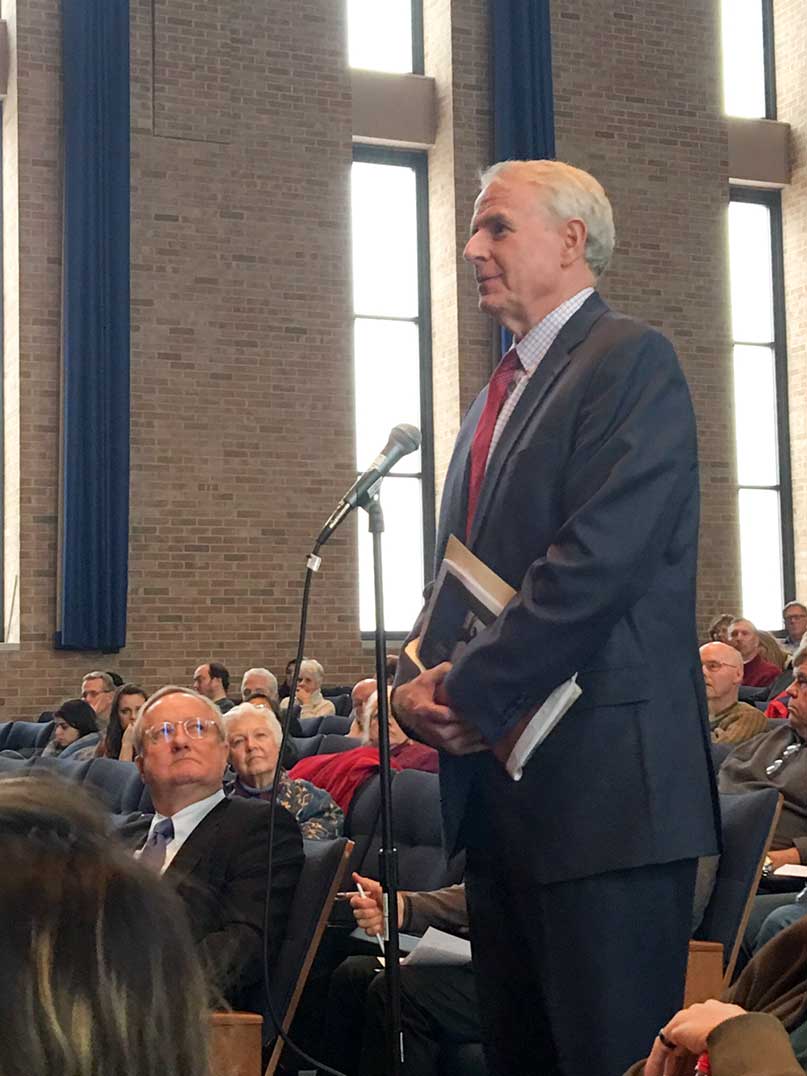Public meeting in Wisconsin underscores test of existing agreement
by James Brainard
Special to The Expositor
WAUKESHA, Wisc.—With the first test of the Great Lakes Compact hanging in the balance, nearly 300 people attended Thursday’s public hearing at Carroll University in Waukesha to hear the official briefing and to comment on Waukesha’s water diversion proposal. Opinion was sharply divided.
Jointly held by The Great Lakes St. Lawrence River Water Resources Regional Body (the Regional Body) and the Great Lakes Compact Council (Compact Council) the session was a required step in the diversion review process as mandated by the Compact. On stage listening to over three hours of comment were representatives of the eight Great Lakes states and the provinces of Quebec and Ontario, with Jennifer Keyes, manager of the Water Resources Section of the Ministry of Natural Resources and Forestry, representing Ontario.
“The process has been interesting and informative,” Ms. Keyes said. “Yesterday we were given a tour of Waukesha, and the region, and we were able to ask questions and have frank discussions. We are learning a lot.”
“This is fascinating to watch,” said Peter Annin, author of Great Lakes Water Wars. “The process outlined in the Compact seems to be working well. We are seeing history being made.”
After years of study, the Wisconsin Department of Natural Resources determined that Waukesha’s request to divert 10.1 million gallons a day was justified and met the conditions specified by the Compact. The state then forwarded the request to the Regional Body and the Compact Council, initiating the review.
“We are heading home Friday,” Ms. Keyes said, “with lots of information to consider. On April 21 the Regional Body votes on the Waukesha proposal and we send our Declaration of Finding to the Compact Council.” Ontario and Quebec are voting members of the Regional Body. The finding, while influential, is only advisory.
The Council, composed of the eight Great Lakes governors, will make a final determination in May. All eight governors must vote in favour or the diversion request cannot proceed.
Supporters of the diversion proposal commented that using Great Lakes water was the only real option for Waukesha, citing public health issues caused by radium and other contaminants in the city’s well water.
“The Waukesha water diversion request before you addresses a serious public health threat in a way that does not threaten Great Lakes water levels or water quality and that does not deplete our deep or shallow groundwater aquifers,” said Steve Baas, senior vice president for public policy with the Metropolitan Milwaukee Association of Commerce. “The request strengthens our regional economy.”
A spokesperson for U.S. Sen. Ron Johnson (R-Wis.), who is in a tough re-election campaign, urged the Great Lakes states to approve the city’s request. Others speaking in favour were primarily Waukesha’s elected officials and city employees.
Dozens of speakers said the Waukesha proposal does not meet the Compact’s requirements and should be rejected.
Milwaukee mayor Tom Barrett said that Milwaukee had long wanted to work with Waukesha as it would benefit both cities, but could not do so because Waukesha was asking for water to supply an expanded service area in violation of the Compact. He questioned the move on the part of Waukesha to buy water from Oak Creek, farther away.
Racine Mayor John Dickert objected, saying that Waukesha’s return flow would be discharged into the Root River, which winds through Racine. Racine, he said, has worked hard to clean up its harbour and beaches. “We do not want what Waukesha wants to send us. We don’t want pharmaceuticals, phosphates, microbeads, any of that. We don’t want to be Waukesha’s toilet.” Mayor Dickert also said that approving the Waukesha diversion request would “crack the compact. You crack this egg and you are looking at some serious legal battles.”
State Representative Cory Mason (D-Racine) said, “the DNR got it wrong. Waukesha is asking for almost double the amount of water it currently uses. This is not a water improvement plan but an urban sprawl plan.”
Former Wisconsin DNR Water Section Chief Todd Ames, one of the architects of the Compact, said that the only justification for a diversion is to provide potable drinking water to existing customers, which is not what Waukesha proposes.
Karen Hobbs, deputy policy director for the Natural Resources Defense Council, said Waukesha is not doing enough to conserve water, as required by the Compact.
Waukesha’s conservation goal of reducing demand by 1 million gallons a day by 2050 “represents roughly one-quarter of one percent in additional annual water savings each year,” she said. The city’s conservation effort “is too reliant on voluntary and educational measures. There are no mandatory measures; there are no robust conservation plans.”
Other organizations contributing comments in opposition to the Waukesha diversion included the National Wildlife Federation, The American Civil Liberties Union, Clean Wisconsin, Milwaukee Riverkeeper and Midwest Environmental Advocates.
The volume of comments on this historic first test of the Compact has been enormous. But more are still welcome at waukeshadiversion.org. The deadline for comments is March 14. Eventually, all comments will be posted on the website.




